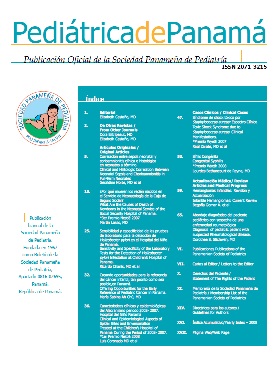Zika virus disease and its neurological complications
1
Zika virus is a mosquito-borne avivirus identi ed in Africa in 1947. Most a ected people has no symptoms and when present they are mild and include: fever, maculopapular rash, athralgias, and myalgias. Since 2015 the virus has spread through the Americas to more than 31 countries and territories until the beginning of this year. People of all ages could be a ected by Zika including fetus. Maternal-fetal transmission has been documented. Evidence suggest that congenital Zika virus occurs when the fetus is exposed to the virus during the rst few months of gestation and is associated with microcephaly and other central nervous system malformations. Zika long term sequelae of congenital, perinatal and pediatric diseases are largely unknown. No vaccine to prevent Zika virus infection is available and the treatment is only of support. This review article is an update regarding the main epidemiologic, clinical, laboratory testing, treatment and prevention with particular attention to the neurological complications.
Show Affiliation
Authors
DOI:
https://doi.org/10.37980/im.journal.rspp.20171637Keywords:
Zika virus, children, neurological changesAbstract
AbstractZika virus is a mosquito-borne avivirus identi ed in Africa in 1947. Most a ected people has no symptoms and when present they are mild and include: fever, maculopapular rash, athralgias, and myalgias. Since 2015 the virus has spread through the Americas to more than 31 countries and territories until the beginning of this year. People of all ages could be a ected by Zika including fetus. Maternal-fetal transmission has been documented. Evidence suggest that congenital Zika virus occurs when the fetus is exposed to the virus during the rst few months of gestation and is associated with microcephaly and other central nervous system malformations. Zika long term sequelae of congenital, perinatal and pediatric diseases are largely unknown. No vaccine to prevent Zika virus infection is available and the treatment is only of support. This review article is an update regarding the main epidemiologic, clinical, laboratory testing, treatment and prevention with particular attention to the neurological complications.
Downloads
Published
2022-08-20
Issue
Section
Updates
License
Copyright (c) 2020 Pediatric Journal of PanamaDerechos autoriales y de reproducibilidad. La Revista Pediátrica de Panamá es un ente académico, sin fines de lucro, que forma parte de la Sociedad Panameña de Pediatría. Sus publicaciones son de tipo gratuito, para uso individual y académico. El autor, al publicar en la Revista otorga sus derechos permanente para que su contenido sea editado por la Sociedad y distribuido Infomedic International bajo la Licencia de uso de distribución. Las polítcas de distribución dependerán del tipo de envío seleccionado por el autor.






